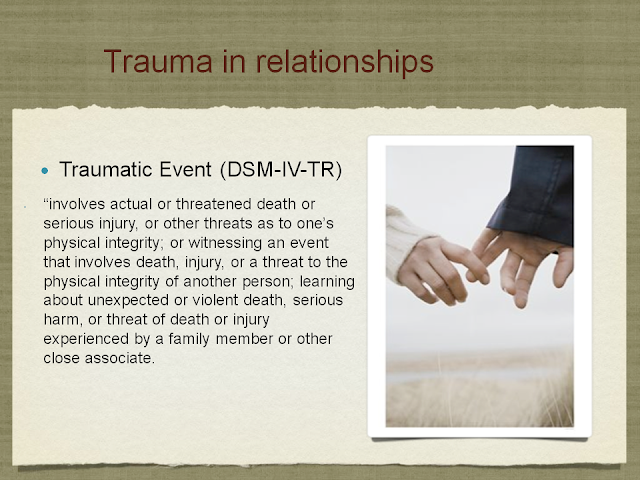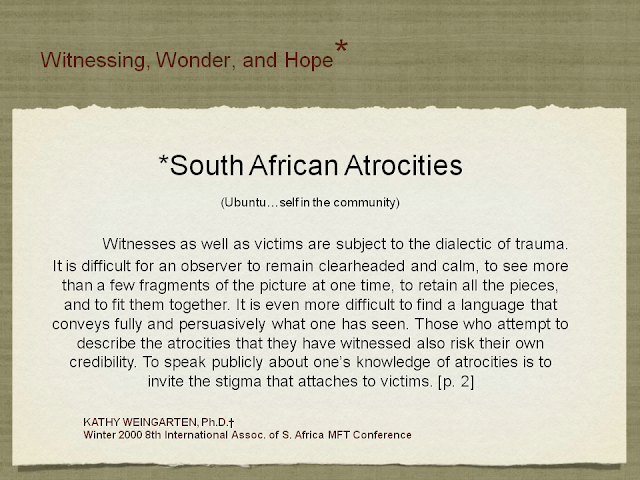A presentation given at the Traumatic Brian Injury Community Support Group, September 11, 2012
What do you see & what emotions does this painting invoke in you?
- I see the traumatic event of death and loss of a child. I see vulnerability, pain and suffering.
- The emotion that it invokes in me is saddness and a desire to witness, in empathy, for us who suffer from trauma and great loss.
- I also see the potential for destructive entitlements; I have suffered and therefore others must suffer as well...
- Today, I want to present on healing from loss and tauma through "witnessing;" as well as, create greater awarness & understanding around trauma & loss in relationships.
- This will not only help us heal but break the silence that often prevails around trauma and loss.
- Our ability to take our traumatic experiences and loss and turn it into constructive entitlements; I have suffered and loss but I can move past this and continue to contribute to society (e.g. MADD: Mothers Agianst Drunk Driving)
What traumatic events have you experienced and those of your family members, relatives and friends?
Have some suffered consequences and different severities than others who have suffered a similar tauma?
- No two people respond the same to a similar traumatic event. The consequences and severity are variable. (e.g. one soldier will not experience PTSD where as another will suffer severe symptoms; another may experience moderate symptoms directly after the traumatic events to never agian suffer.
Some traumas occur multiple times and over a specific time period as does the symptomology. (e.g. TBI's effect the lifestyle of individuals for the length of thier life and comes with various consequences and severities. They experience much loss in ability, lifestyle choices and relationships.) Acute trauma may be a car crash that happened once; with little to no long term consecuences. We experience the immediate loss of control, safety and fears relating to such an event and than it fades.
Emotional dysregulation leaves us in a constant fluctuation of moods and irritability. The strong emotions of fear, shame, anger, saddness begin to overwhelm an individual leaving them with a diminsihed ability to cope and reason with thier enviornments and relationships. A sense of safety is so greatly diminished the trust seems impossible to extend to the world and those one interacts with. The ability to percieve danger and safety become clouded by the hurt and pain. One can feel hopeless, helpless and lost in relationships when unable to determine there trustworthyness and safety. We all need safety, control and some stability in our emotional lives. An overwhelming sense of vulnerability kicks in and puts us on the continual defensiveness. Our evolutionary biology through our nueral chemistry constantly tells our mind and heart we aren't safe. Anxiety, depression and a constant need to fight or flee becomes the norm when chronic trauma impacts an individual.
We are relational creatures and experience a measure of interdependence and connectedness with others. Our traumas often effect those who seek to support us in our burden. Traumitization will be explained more fully later on as there are different types of witnessing. With trauma being present with someone is often all you can do. As caregivers;especially of children we seek to fix, solve and remove thier pain. We become over involved, under-involved and helpless in our many attempts to fix, alleviate and restore that which was lost to them and us. With TBI memory loss often occurs and result in great adaptations to daily functioning and relationships. As your partner recalls a cherished memory and for you it is gone. In the loss you experience they share in the loss of connection around important issues to them or the need to adapt to a partners memory loss. It can become tiresome, burdensome and exhausting to accomadate the losses and new ways of living, coping and loving.
Partners of those with TBI's or who have chronic traumas and loss; witness possible death, injury, or a threat to the physical integrity of thier partner. In the after math the continue to witness the threat to the integrity of the individual...I would add spiritually, emotionally and mentally. This witnessing has shown to result in equal if not more suffering than the actual partner who suffered the trauma. Research shows that partners and those who witness atrocities can suffer great severeity and mumerous consequences resulting in debilitating anxiety, depression and other mental illness. As Ubuntu articulates our interconnectedness...trauma is a relational issue as much as it is an individual.
Today, I hope we can begin to witness not only for ourselves, but for our partners, the loss and trauma they experience on account of our relational interconnectedness. Through witnessing for ourselves and others we find our self in community and break the silence that often retraumatizes us. This is especially crucial when addressing domestic violence, sexual assault and child abuse. There is great shame that stigmatizes victims and keeps them in the framework of victimization.
We must resist the urge to withdraw and isolate on account of our traumas. It is not natural. Reaching out and healing in relationships is just as natural as resisting and withdrawal. It must become a matter of choice.
What will you do with your trauma and loss? It is yours; whether asked for or not. I encourage you to find other ways to be a determined witness to those who suffer.











Amazing presentation and delivery! The TBI group was awesome. You gauged your audience so well and spoke with sincerity and sensitivity. What a powerful lesson that the spirit of Ubuntu has expressed. Anyone can benefit from it. And how healing it could be with people who suffer from a Tramatic Brain Injury. You are a wonderful public speaker, and I have a feeling this is just the beginning.
ReplyDelete